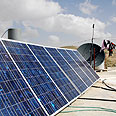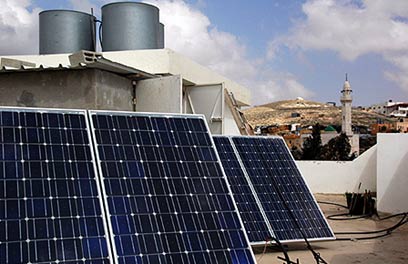
Catching some rays, Darijat style
Bedouin village named first solar-powered community in Israel, the world after taking part in energy conservation project. Trial proves mixed blessing as it lacks funding needed to continue
In first glance, the Negev Bedouin village of Darijat seems like dozens of other villages of its kind: Nestled in the hub of a long, winding dirt road are one-story buildings, dusty SUVs, yards in which sheep and goat graze lazily – and solar panels, as far as the eye can see.
Darijat is Israel's – and the world's – only solar-powered community.
The village was chosen to take part in an experimental government program some two-and-a-half years ago and ever since its homes, streets and even local mosque – nicknamed the world's first solar mosque – have been powered by the solar panels, erected on rooftops.

Solar panels on Darijat rooftop (Photo: Sharon Braverman)
The program, a brainchild of the Ministry of National Infrastructures and the Ministry for the Development of the Negev and the Galilee was launched with an initial budget of NIS 1 million ($276,000) and included 20 homes.
Turing the village into a solar-powered community hit quite a few snags in the early stages: Up until 2004, Darijat was considered a remote Bedouin village, which supplied its own electricity using generators and was not even connected to Israel's main water grid.
The generators worked for four hours a day and were costly to operate – three times more costly than normal electricity. "We had some reservations after agreeing to join the program," said local council head, Yitzhak Abu Hammed, but knowing that operating the generators would only get more expensive, persuaded him.
Global recognition
The gamble proved successful: The homes connected to solar-panels reported nearly no malfunctions and a significant drop in expenditures.
"Today, those who have yet to join the project ask to be included in it, or even but their own solar panels," said Hammed. The project's success, he added, has the neighboring villages interested in the program as well.
The world's first solar mosque (Photo: Sharon Braverman)
In May 2007, Darijat won a global contest in energy conservation and was awarded worldwide recognition of its efforts; which makes one wonder about the government's lack of continual funding for the project.
"The original plan was to have the entire village go solar," said Eddy Beit-Hazebdi of the Ministry of National Infrastructures, who heads the program.
"Unfortunately, despite the program's success, we were unable to materialize its second stage and hook an additional 60 homed to solar panels," he added. The program currently lacks some $800,000; "but I'm hopeful," he concluded.
Meir Sahar, CEO of the Negev Development Authority remains optimistic: "We need additional funding. This is an important, successful program and I hope we'll be able to find an independent organization to help us push it forward."











